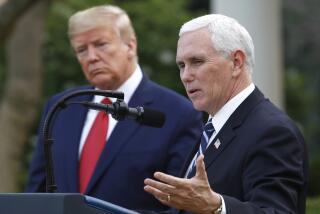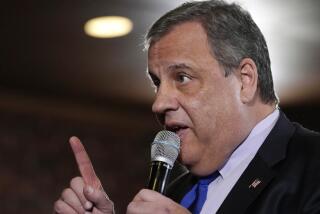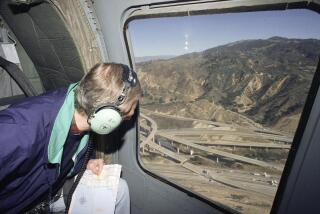Wilson Dissects Failed Run for White House
- Share via
SACRAMENTO — In his first interview since dropping out of the presidential race 10 days ago, Gov. Pete Wilson offered a candid evaluation of his doomed bid for the White House, starting with his early consideration of a vice presidential candidacy under Sen. Bob Dole and his later realization that even his support in California was unexpectedly soft.
Wilson revealed to The Times that he met with Dole in Washington in February when he was still considering a presidential campaign that would have pitted him against his longtime friend, the Senate majority leader. Wilson said he was under the impression that Dole would offer him a role as running mate, but during the meeting he realized he was mistaken.
“I had been led by a person close to him to expect that [offer], and I think largely that turned out to be a function of this person’s desire,” Wilson said. “Whatever enthusiasm [Dole] may have had for that, I don’t know.”
The governor said he might have accepted the potential job of vice president instead of running for the White House.
“I probably would not have said to him, ‘No,’ ” Wilson continued. “But it was not something that I was looking for. I might have entertained the idea with him, but it’s not as interesting a job as this one, except with respect to defense and foreign policy.”
Wilson said he subsequently decided that he could beat Dole in a Republican primary and, in March, he launched his own presidential exploratory committee.
Today, Wilson said, he is no longer interested in serving as vice president. “This is a better job,” the governor repeated.
Campaign Problems
In the wide-ranging interview, Wilson discussed a number of setbacks that he blamed for the demise of his campaign, such as the throat surgery that kept him on the sidelines for more than two months. But even with the problems, Wilson described a campaign that never lost confidence that it could win the White House.
In fact, Wilson made it clear that he believes he was forced out of the race by structural problems in his campaign--not by a personal failing as a candidate. And he said he remains convinced today that his campaign theme was popular and that his strategy to win the White House was working right up to the day he ran out of money.
“It was very painful [to quit], particularly because . . . you can tell when arguments actually work and when they don’t,” Wilson said. “Contrary to the smug assertion by the pundits, where the message was actually heard, it had great resonance. I think that plain and simple, . . . with the exception of a few major skirmishes, we never got into the war.”
One major change Wilson said he would make, however, would have been to better explain to Californians why they should support his bid for President.
Wilson acknowledged that his decision to run for the White House--despite a promise last year that he would not--became a “major vulnerability” for his campaign because it depressed his potential support among California Republicans. Even more distressing, Wilson said, the softness in his California support made it harder to sell his candidacy in the East.
“They had a little difficulty understanding why Californians were not more supportive,” he said.
Wilson said his earlier promise to avoid the presidential race did not keep him from entering the contest because he thought it would be “obvious” to most Californians that they would benefit from having a native son in the White House.
“It’s still very clear that Californians as a whole don’t begin to understand; to appreciate how punishing this [Clinton] Administration has been to them,” Wilson said. “And for that reason, I guess they never really understood--though it seemed to me pretty obvious--that a President from California . . . offered them a far greater hope of relief.”
Wilson said his standing in California was sabotaged by attacks and malicious rumors spread by opponents in the White House and other Republican campaigns who considered him a major threat. At the same time, the governor said, Clinton improved his popularity in California with a number of “cosmetic”--but high-profile--offerings of assistance to the state.
“What this means is that most people get their news from television and their impressions are formed by seeing the President come here for natural disasters--and we have offered him numerous opportunities for that--and have seen him coming out to dispense back their own tax dollars,” Wilson said.
“The thing that we neglected to do is make the case to Californians how they were being hurt by this Administration,” Wilson said. “ . . . We thought that most people would understand how much more effective a president could be even than a governor.”
If he had it to do again, Wilson said, he would launch a campaign to tell Californians about how the Clinton White House has reduced jobs in the state by closing military bases, enforcing overly aggressive environmental policies and thwarting state water policies.
By contrast, Wilson said, “I would have appointed very different people.”
Wilson’s comments came during an interview in his Capitol office Saturday afternoon that lasted about an hour and a half. He was relaxed and casual, especially compared with the defensive posture he assumed in the final weeks of his campaign. He wore a forest green, plaid sport shirt, white cotton slacks and beige suede shoes.
He also spoke thoughtfully, saving any anger for the Clinton White House and not for anyone he blames for his campaign’s problems.
Wilson said his decision to drop out was painful but not difficult. As he did when he announced his departure from the race, Wilson said his organization was bankrupt and highly unlikely that it could recover.
Wilson acknowledged some of the problems identified by national observers as factors that led to the demise of his candidacy.
He admitted that his campaign underestimated how much more difficult it is to raise money in a presidential race compared to his reelection effort in California last year. But he dismissed suggestions that his downfall was caused by rivalries on his staff or that his controversial stands against affirmative action or illegal immigration were overly negative.
A Rocky Trail
In addition to the soft support in California, Wilson said, his greatest setback was his forced absence from the campaign trail after throat surgery.
Wilson said he had expected his voice to fully recover within two weeks of the surgery in April. After the procedure, however, he learned that his surgeon felt it was necessary to make a larger than expected incision in his vocal chords to remove a nodule and some accompanying tissue.
Wilson said he did not second-guess his doctor’s care and, in retrospect, does not believe there is anything he could have done differently to avoid the damage to his campaign.
“It was terribly frustrating . . . but the fact there was this prolonged silence allowed some people who are less than scrupulous to start rumors,” Wilson said. “Rumors spread around New York and in Washington that I had throat cancer and I was going to have to drop out. Well, that in combination with the month or so we spent on the budget here really had me effectively absent from the field when I should have been there.”
Wilson’s problems reached a peak late last month when he decided to close his office in Iowa and focus instead on more friendly states in the Northeast. The move was interpreted by supporters and critics as a sign of weakness from an already struggling campaign.
About the same time, Wilson said, he learned that his campaign was deeply in debt. In the following days of damage control, the campaign accepted resignations from the national finance director and the governor’s former top campaign adviser, George Gorton.
Wilson said the staff rivalries on his campaign were “overblown,” but declined to discuss the personalities. He hinted at disappointment in the fund-raising staff that surprised him with the bad news when it was too late to recover. But he assumed responsibility for the campaign and would not blame others for the problems.
Wilson’s campaign began last spring with high expectations from many national pundits due largely to the governor’s proven ability to raise money and his past success in California elections. But even then, campaign officials acknowledged they were off to a late start, especially compared to Wilson’s chief rivals.
As a result, one strategy was to solicit fellow Republican governors and try to piggyback their support networks in key states.
But Wilson said that turned out to be difficult because governors, by nature, are politically cautious. He said he hoped several would have joined his campaign if it had caught on, but that it was unlikely many would take a risk by helping his campaign.
“They are first and foremost concerned with their own interest and I cannot begrudge them that,” Wilson said. “A great many told me, including some who went for other candidates, that they were personally very much in sympathy with me but for reasons that were purely local, they felt it necessary to do something else.”
If his campaign had caught on, Wilson said, he believes he could have won the key support of New Hampshire Gov. Steve Merrill despite their different positions on abortion and the sharp criticism Wilson received in the state’s major newspaper, the Manchester Union Leader. Wilson said the two have similar views on welfare reform, crime legislation and spending plans.
“I think he wanted very much to do so and indicated that there were reasons that he could,” Wilson said. “He said to me two-thirds of the Republicans in his state are pro-choice, so I don’t think that was beyond the realm of possibility.”
More to Read
Get the L.A. Times Politics newsletter
Deeply reported insights into legislation, politics and policy from Sacramento, Washington and beyond. In your inbox twice per week.
You may occasionally receive promotional content from the Los Angeles Times.










